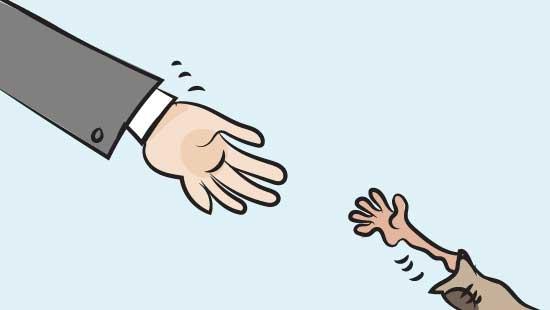Reply To:
Name - Reply Comment

In Sri Lanka, despite a multitude of problems, democracy still survives. Traditionally the norms of democracy are the Presidency, Parliament, the Judiciary and the Free Media. For democracy to thrive, the spirit of humanitarianism is also needed. This often comes out of spirituality that brings love, joy, peace patience and kindness, humility, meekness, faithfulness and kindness. To what extent humanitarian thrive in Sri Lanka cannot be calculated, but we know and have experienced that our care for others is a measure of our greatness. Without this care, we often act with selfish self-centred motives or personal gain or glory.
On August 19 the United Nations marks World Humanitarian Day. In a statement, the UN says there is a saying that goes: It takes a village to raise a child. Similarly, it takes a village to support a person in a humanitarian crisis. With record-high humanitarian needs around the world, this year’s World Humanitarian Day (WHD) builds on this metaphor of collective endeavour to grow global appreciation of humanitarian work
According to the UN, whenever and wherever people are in need, there are others who help them. They are the affected people themselves – always first to respond when disaster strikes – and a global community that supports them as they recover. Far from the spotlight and out of the headlines, they come together to ease suffering and bring hope.
The 2022 WHD campaign shines a light on the thousands of volunteers, professionals and crisis-affected people who deliver urgent health care, shelter, food, protection, water and much more. The UN says it believes will use digital art to tell the stories of people in need and those who help them. At the centre of the campaign is a series of beautifully illustrated aid worker profiles that show the breadth and depth of humanitarian work and collectively symbolize the wider humanitarian village.
On August 19, 2003, a bomb attack on the Canal Hotel at Baghdad in Iraq, killed 22 humanitarian aid workers including the UN Secretary General’s Special Representative Sergio Vieira de Mello. Five years later, the United Nations General Assembly adopted a resolution designating August 19 as World Humanitarian Day (WHD).
Each year, WHD focuses on a theme, bringing together partners from across the humanitarian system to advocate for the survival, well-being and dignity of people affected by crises and for the safety and security of aid workers.
For this year’s WHD, the UN shows the importance, effectiveness and positive impact of humanitarian work.
In 2021, 460 aid workers were attacked: 140 killed, 203 wounded and 117 kidnapped.
Of the aid workers who died, 98% were national staff and 2% were international (expatriate) staff - more than half (53%) were staff of national NGOs.
Most of the violence took place in South Sudan, Afghanistan and Syria.
Casualties are expected to rise significantly in 2022 due to the war in Ukraine, where rocket attacks and shelling threaten civilians and aid providers equally.
The 2021 Humanitarian Needs Overview estimated that 20.7 million (67% of the population) people need humanitarian assistance, 12.1 million of whom are estimated to be in acute need, which makes Yemen the largest humanitarian crisis in the world, the UN says.
In Sri Lanka, we need to form communities or associations that bring together humanitarian workers who are ready to assist and even give their lives to save others. Whatever our politicians do or do not do whatever the level of corruption including politicians and their cronies if the people act with a spirit of goodwill we will have a just and fair society where issues; like such as poverty alleviation, climate change and crisis-resolution could be handled with humanitarian mission and not with ideas of coming to power and making hundreds of millions at the expense of poor and middle-class people.
Earnest Hemingway wrote in his famous book titled, “For whom the bells toll”—“I belong to humanity and every person’s death diminishes me”.